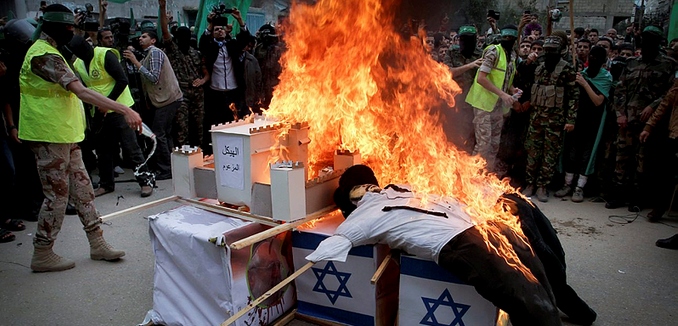A report released by a controversial commission of inquiry appointed by the United Nations Human Rights Council (UNHRC) equated Hamas’ terror attacks against civilians with Israel’s self defense against Gaza-launched rockets, The Jerusalem Post reported today.
Both Israelis and Palestinians may have committed war crimes during the 2014 Gaza war, a United Nations Human Rights Council commission of inquiry said in a 200-page report it published in Geneva on Monday.
“The commission was able to gather substantial information pointing to serious violations of international humanitarian law and international human rights law by Israel and by Palestinian armed groups,” the report said. …
The Palestinian Authority is expected to make use of this report when it submits war crimes complaints against Israel to the International Criminal Court, possibly as early as this week.
The commission was embroiled in controversy since professor William Schabas was appointed to head it last year. Schabas had once stated that he wanted to see Israeli Prime Minister Benjamin Netanyahu prosecuted for war crimes. In February, Schabas resigned from the commission when it was revealed that he had been paid by the Palestine Liberation Organization (PLO) to do legal work.
Aside from the general conclusion that both sides may have committed war crimes, the report made a number of questionable judgments.
Reuters reported that the commission construed threats made by Hamas to attack Israeli civilians as warnings.
The United Nations Independent Commission of Inquiry on Operation Protective Edge was released on Monday, saying Israel and Palestinian groups both committed abuses in the Gaza war that may amount to war crimes while also citing a press release from Hamas’ military spokesperson Abu Obeida, saying that, “In some instances, Palestinian armed groups in Gaza reportedly attempted to warn civilians in Israel of imminent attacks.”
Avi Issacharoff dismissed this claim in a critique of the commission, noting, “[w]ith regard to warnings, the UN report interpreted threats by Hamas that it would target Tel Aviv and Ben Gurion Airport as concrete warnings to Israeli civilians.”
The principle of distinction is essential to determining whether war crimes were committed. The commission wrote that the “absence of that information” about certain targets means that Israel may not have legitimately chosen targets. However, as David Daoud wrote in Everything You Need To Know About International War And The Gaza War, which was published in the September 2014 issue of The Tower Magazine, “only deliberate attacks directed specifically at civilians or their objects are considered war crimes under the International Criminal Court’s statutes.”
The UNHRC report also faulted Israel for use of explosive devices in built up areas. But Yonah Jeremy Bob, legal analyst for The Jerusalem Post, previously noted that Hamas operates in civilian areas, and “[t]he report does not seem to consider how else the IDF could fight Hamas under these circumstances.” A similar concern was raised by NGO Monitor, which argued that the “lack of military expertise” on the commission compromised the credibility of the report.
The UNHRC report also doesn’t emphasize the number of times Hamas violated a ceasefire. According to an Israeli official last year, Hamas rejected or violated 11 ceasefires prior to accepting the one that ended last year’s fighting. Hamas could have accepted a number of Israeli offers at the outset of the hostilities to stop firing rockets at Israel and avoid a military confrontation. A number of Israeli columnists, including one who is often critical of Netanyahu, praised the prime minister for his restraint.
The New York Times today quoted a legal expert who questioned whether the commission had any basis for investigating Israel.
Prof. Amichai Cohen, an international law expert at the Israel Democracy Institute, submitted an opinion to the commission, not about the substance of the military’s operations but about its ability to investigate itself, a critical issue that could prevent the international court from taking up cases.
Citing recent overhauls, Professor Cohen argued that the United Nations’ “intervention” is “not justified and undermines the basis of the international demand to establish investigative mechanisms and adopt international law in the Israeli legal system.”
The blogger “Elder of Ziyon” also demonstrated how the commission of inquiry skewed the legal meaning of the term “occupation.” Gerald Steinberg, president of NGO Monitor, faulted the commission for relying on NGOs “which clearly lack any systematic or professional fact-finding methodology.”
[Photo: Abed Rahim Khatib/ Flash90 ]




